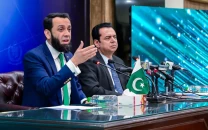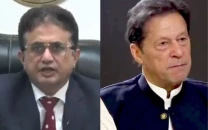Pakistan leads the charge for Youth Rights at Commonwealth
Commonwealth can't afford to dilute youth governance structures when young people face unemployment, climate stress

As a Member of the National Assembly of Pakistan and the Focal Person of the Prime Minister’s Youth Programme (PMYP), I had the honour of representing our country at the 10th Commonwealth Youth Ministerial Task Force (CYMTF) Meeting in Kuala Lumpur, a moment that truly tested the Commonwealth’s commitment to its 1.5 billion young people. With the introduction of the new Strategic Plan 2025–2030, this year’s discussions marked a turning point. For the first time, youth development appeared at risk of being financially reduced and institutionally diluted. I felt it was both my responsibility and Pakistan’s responsibility to speak clearly, firmly, and decisively in defence of youth interests. And we did.
Throughout the sessions, I made it absolutely clear that Pakistan would not support any attempt to weaken the Commonwealth Youth Programme (CYP). I strongly opposed the idea of absorbing CYP into broader thematic areas or mixing its dedicated youth funds into general accounts. I explained that youth funding must remain protected and ring-fenced; that the CYP must retain its institutional identity; that Youth Ministers must be consulted before approving any major structural shifts; and that the CYP Memorandum of Understanding endorsed at CHOGM must remain the governing document over all new policy frameworks. My interventions reflected not only Pakistan’s expectations but the concerns of many other member states who feared that youth development might be sidelined under the new Strategic Plan.
Representing Pakistan also meant carrying forward the strong and principled message of the Chairman of the Prime Minister’s Youth Programme. He had earlier reaffirmed Pakistan’s deep commitment to youth empowerment across all Commonwealth regions. On his behalf, I highlighted how Pakistan views the Commonwealth as a long-term partner for expanding youth leadership opportunities, strengthening digital and climate inclusion, supporting meaningful youth participation in governance, and unlocking new economic pathways for young people. I emphasized Pakistan’s readiness to collaborate, to lead, and to help shape modern, youth-centered policies within the Commonwealth’s evolving structure.
I also had the opportunity to showcase Pakistan’s remarkable progress under PMYP. I spoke proudly about the establishment of our National Youth Council, the successful hosting of the CAYA Youth Summit 2025 in Islamabad with participation from 12 countries, and the creation of the CAYA Secretariat in Pakistan. I highlighted our ongoing programmes focused on education, employment, digital skills, entrepreneurship, and climate resilience. I shared Pakistan’s lived experience in youth development, emphasizing that when you invest in young people, you strengthen national stability, innovation, and prosperity. These achievements resonated with many delegations, reinforcing Pakistan’s leadership role in the Asian youth landscape.
Given the seriousness of the issues raised, I joined Pakistan’s official delegation in calling for a special meeting with the Commonwealth Secretary-General. We requested clarity on how youth commitments would be protected under the new Strategic Plan and emphasized that the CYP MOU remains fully binding. We insisted that the CYP Fund must continue as a separate account and that Youth Ministers’ consultations should be restored as a mandatory part of the decision-making process. We also urged the Secretariat to issue a formal communication to all High Commissions confirming that the CYP remains intact and operational.
My message to the Commonwealth throughout the meeting was simple: youth are not a side theme, they are the foundation of our shared future. At a time when young people across the world face unemployment, climate stress, mental health challenges, and economic uncertainty, the Commonwealth cannot afford to dilute youth programming or weaken its youth governance structures. With two-thirds of the Commonwealth’s population under 30, any reduction in youth investment is not just a policy misstep, it is a direct threat to our collective future.
Representing Pakistan in this historic meeting was not only an honour but also a profound responsibility. As a young parliamentarian and national youth representative, I felt proud to defend youth rights at the highest level, to represent the vision and direction of the Prime Minister’s Youth Programme, and to carry forward the Chairman’s leadership in this international forum. This experience marks the beginning of a stronger and more strategic phase in Pakistan’s relationship with the Commonwealth, one that holds the promise of greater opportunities, deeper cooperation, and wider recognition for our young people.
Pakistan stands firm for its youth, for its commitments, and for its role in shaping a stronger, more inclusive, and youth-empowered Commonwealth.
The writer is a serving Member of the National Assembly of Pakistan and Focal Person PM Youth Program



















COMMENTS (1)
Comments are moderated and generally will be posted if they are on-topic and not abusive.
For more information, please see our Comments FAQ